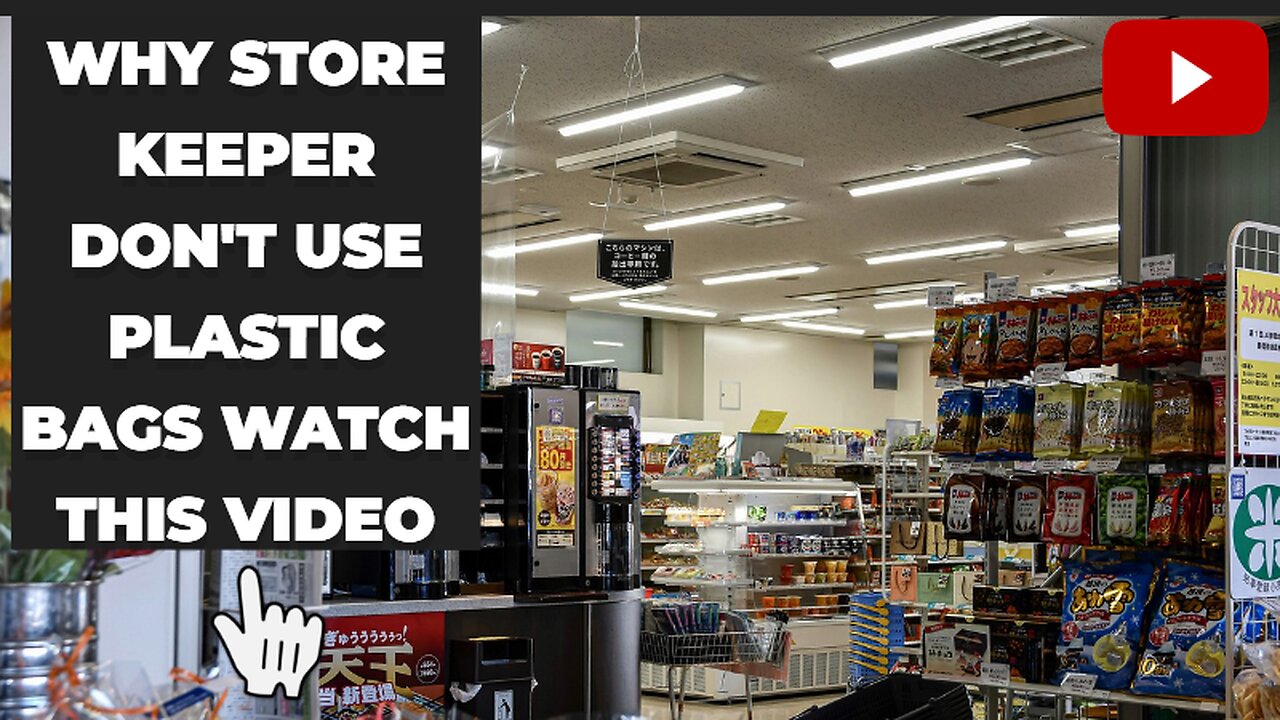Premium Only Content

Why Store Keepers Don't Use Plastic Bags
Plastic bags have several disadvantages, both for the environment and human health. Some of the key disadvantages include:
Environmental Impact: Plastic bags are non-biodegradable, meaning they do not break down easily in the environment. This leads to their accumulation in landfills, water bodies, and natural habitats, causing pollution and negatively affecting ecosystems.
Litter and Aesthetics: Plastic bags are often lightweight and can easily become litter when not disposed of properly. They can be seen littering streets, parks, and oceans, contributing to a decline in the visual appeal of the environment.
Wildlife Hazard: Animals, particularly marine life, can mistake plastic bags for food, which can lead to ingestion and choking. Plastic bags can also entangle wildlife, causing injuries or even death.
Resource Depletion: The production of plastic bags requires significant amounts of natural resources, including fossil fuels (such as oil) and energy. This contributes to the depletion of finite resources and increases carbon emissions.
Microplastic Generation: Over time, plastic bags can break down into smaller fragments called microplastics, which are less than 5mm in size. These microplastics can enter the food chain, affecting both marine and terrestrial ecosystems and potentially harming human health.
Toxicity: Some plastic bags, particularly those made from low-quality plastic, may contain harmful chemicals that can leach into the environment over time. These chemicals can pose risks to both aquatic and terrestrial organisms.
Inefficient Recycling: While some plastic bags can be recycled, the process is often complicated and costly. Many plastic bags end up in mixed waste streams, making recycling difficult and contributing to the overall problem of plastic waste.
Energy Intensive Production: Manufacturing plastic bags requires a significant amount of energy. This contributes to greenhouse gas emissions and climate change.
Economic Costs: Plastic bags can clog stormwater systems, leading to maintenance costs for municipalities. They can also damage machinery at recycling facilities, increasing operational expenses.
Alternatives Available: There are more sustainable alternatives to plastic bags, such as reusable bags made from cloth, jute, or other materials. Using these alternatives can help reduce the demand for single-use plastic bags.
Efforts to address these disadvantages include implementing plastic bag bans or fees, promoting reusable bags, and raising awareness about the environmental impact of plastic bags. It's important to note that the disadvantages of plastic bags vary based on factors such as waste management infrastructure, local regulations, and consumer behavior.
-
 LIVE
LIVE
megimu32
2 hours agoON THE SUBJECT: The Epstein List & Disney Channel Original Movies Nostalgia!!
234 watching -
 9:06
9:06
Colion Noir
11 hours agoKid With Gun Shoots & Kills 2 Armed Robbers During Home Invasion
25.8K3 -
 54:28
54:28
LFA TV
1 day agoUnjust Man | TRUMPET DAILY 2.27.25 7PM
33.6K2 -
 20:10
20:10
CartierFamily
8 hours agoAndrew Schulz DESTROYS Charlamagne’s WOKE Meltdown on DOGE & Elon Musk!
48.3K58 -
 1:36:39
1:36:39
Redacted News
6 hours agoBOMBSHELL EPSTEIN SH*T SHOW JUST DROPPED ON WASHINGTON, WHAT IS THIS? | Redacted w Clayton Morris
157K258 -
 2:03:31
2:03:31
Revenge of the Cis
7 hours agoEpisode 1453: Fat & Fit
55.1K8 -
 2:38:12
2:38:12
The White House
8 hours agoPresident Trump Holds a Press Conference with Prime Minister Keir Starmer of the United Kingdom
179K61 -
 1:01:04
1:01:04
In The Litter Box w/ Jewels & Catturd
1 day agoDrain the Swamp! | In the Litter Box w/ Jewels & Catturd – Ep. 751 – 2/27/2025
96.7K37 -
 1:11:24
1:11:24
Dr. Drew
9 hours agoNEW: Cardiac Arrest In Healthy Young People After mRNA w/ Nicolas Hulscher – Ask Dr. Drew
76.2K38 -
 4:24:53
4:24:53
Right Side Broadcasting Network
13 hours agoLIVE REPLAY: President Trump and UK Prime Minister Starmer Meet and Hold a Press Conference 2/27/25
169K47